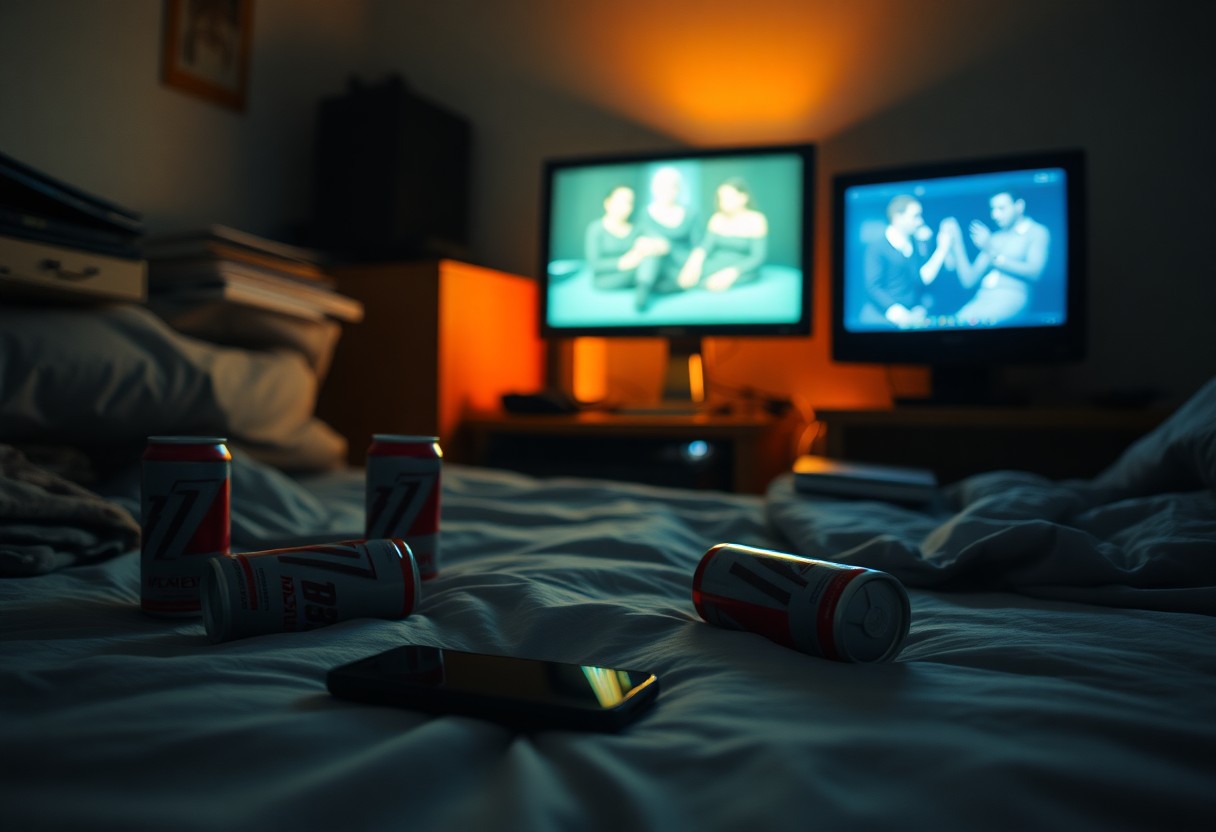Porn consumption can significantly affect your mental and physical well-being. As you engage with adult material frequently, you may find it distorts your expectations and understanding of real-life intimacy. This blog post will explore the various negative consequences of excessive porn viewing, including addiction, relationship issues, and unrealistic sexual standards, helping you recognize the potential harms and guiding you toward healthier alternatives.
Key Takeaways:
- Excessive porn consumption can lead to unrealistic expectations about sex and intimacy, affecting real-life relationships.
- It may contribute to desensitization, resulting in decreased sexual arousal and dissatisfaction with partners.
- In some cases, habitual viewing can lead to addiction-like symptoms, impacting mental health and daily functioning.
- It can also distort perceptions of body image and sexual performance, creating anxiety and self-esteem issues.
- Prolonged engagement with porn can hinder the natural development of sexual and emotional connections between partners.
The Psychological Impact of Excessive Porn Consumption
Before exploring the effects of excessive porn consumption, it is imperative to understand how it can negatively influence your mental and emotional wellbeing. Over time, regular exposure to explicit content can warp your perceptions of intimacy, relationships, and even self-worth, leading to a variety of psychological issues that can affect your daily life.
Desensitization to Sexual Stimuli
Stimuli that initially seemed arousing may lose their effect on you over time, leading to increased consumption in search of satisfaction. As you become desensitized, what once excited you may no longer elicit the same response, compelling you to seek out more extreme or diverse content to achieve arousal.
Relationship Between Pornography and Mental Health
Psychological effects of pornography extend beyond mere desensitization; they can profoundly impact your mental health. Research indicates that excessive porn consumption can lead to anxiety, depression, and feelings of isolation, creating a cycle that further exacerbates your emotional struggles.
At its core, the relationship between pornography and mental health can be linked to feelings of guilt, shame, or inadequacy that may arise from consuming unrealistic portrayals of intimacy. This can lead you to compare your experiences with those depicted in porn, fostering dissatisfaction with your own relationships and personal life. The disconnect between fantasy and reality can contribute to a distorted self-image, making it vital to recognize the signs and seek healthier avenues for sexual expression and connection.
The Effect on Sexual Performance and Satisfaction
You may find that excessive porn consumption can negatively impact your sexual performance and overall satisfaction. Many users develop unrealistic expectations of sex, often leading to disappointment during real-life encounters. This disconnect can affect your confidence, intimacy levels, and ability to connect with your partner, ultimately diminishing the joy of sexual experiences.
Erectile Dysfunction and Other Issues
At times, the relentless exposure to pornography can lead to erectile dysfunction and other sexual health issues. This occurs because your brain starts associating sexual arousal primarily with screen stimulation rather than real-life intimacy. Over time, this can condition your body to respond inadequately in genuine sexual situations, leaving you frustrated.
Distorted Views on Intimacy and Relationships
Besides physical complications, frequent porn consumption can distort your perception of intimacy and relationships. You may develop skewed notions of what a healthy sexual encounter looks like, often mirroring unrealistic scenarios from adult films rather than genuine human connection.
And this warped view can severely impact how you engage in relationships. When you expect instant gratification and perfect bodies, it can lead to dissatisfaction with your partner, hindering the development of meaningful emotional connections. As a result, you may find your relationships suffer due to misplaced priorities, affecting your ability to foster trust, communication, and affection with those you care about.

The Impact on Self-Esteem and Body Image
Keep in mind that excessive porn consumption can significantly affect your self-esteem and body image. You may find that porn creates unrealistic expectations about physical appearance and sexual performance, leading to feelings of inadequacy. For insight into the side effects of porn addiction, check out If addicted to porn, what would be its side effects and how…
Unrealistic Standards and Comparisons
Between the perfectly sculpted bodies and exaggerated sexual scenarios often depicted in porn, you may find yourself distancing from your own reality. This can lead to unhealthy comparisons and dissatisfaction with your own body, as illustrated below:
| Real-Life Expectation | Pornographic Expectation |
| Average Body Types | Idealized Bodies |
| Normal Sexual Performance | Over-the-Top Sexual Acts |
The Role of Porn in Body Dysmorphia
Comparisons you make while viewing porn can contribute to body dysmorphia, a mental health condition where you perceive bodily flaws that may not exist. As you fixate on these perceived imperfections, your self-worth may diminish, leading to further isolation and anxiety about your appearance.
The emphasis on physical perfection in porn affects your perception of reality, making you question your own attractiveness and desirability. This distorted view can manifest into harmful thoughts and behaviors, often spiraling into anxiety and depression. Understanding this link is vital for reclaiming a healthy self-image and fostering a more realistic perspective towards your body.
Addiction and Compulsive Behavior
Unlike casual viewing, frequent consumption of pornography can lead to addiction and compulsive behavior. This addiction is characterized by an overwhelming desire to seek out pornographic content, often at the expense of other activities and responsibilities. You may find yourself prioritizing these urges over your relationships, work, or wellness, leading to a cycle that is difficult to break.
Understanding Internet Pornography Addiction
Behind the seemingly harmless act of watching pornography lies a potential for addiction that can negatively impact your life. Internet pornography activates the brain’s reward system, making it increasingly difficult for you to find satisfaction in real-life intimacy. As your brain adapts to the constant stimulation, you may crave more extreme content in order to experience the same high, perpetuating the cycle of addiction.
Effects of Addiction on Daily Life
Compulsive porn consumption can infiltrate various aspects of your daily life, affecting your emotional well-being, relationships, and productivity. You may notice a decline in your ability to concentrate or find motivation in everyday tasks as your mind becomes preoccupied with your addiction. Moreover, you might struggle to engage authentically with your partner, resulting in emotional distance and dissatisfaction in intimacy.
Understanding how porn addiction affects your daily life involves recognizing the pattern of avoidance it creates. You may neglect personal responsibilities, lose interest in hobbies, or withdraw from social interactions. This withdrawal can foster feelings of isolation and anxiety, compounding the addiction cycle. Realizing these impacts is the first step toward regaining control and seeking healthier ways to fulfill your emotional and relational needs.

Social and Cultural Implications
Now, it’s crucial to recognize that excessive porn consumption can significantly affect the social and cultural landscape. It can shape norms and standards around intimacy, relationships, and sexual behavior, leading to unrealistic expectations. These changes may affect not only personal relationships but also the broader community by influencing how individuals engage with one another in both romantic and platonic contexts.
Influence on Gender Roles and Expectations
After immersing yourself in pornography, you may inadvertently adopt skewed perceptions of gender roles. The portrayal of men and women in adult films often reinforces stereotypes, suggesting that men should be dominant and women submissive. Such depictions can distort your understanding of equality and respect in relationships, making it challenging to engage with partners in a healthy, balanced manner.
Changes in Attitudes Toward Sex and Consent
An important factor to consider is how watching too much porn can shift your attitudes toward sex and consent. Over time, your expectations and perception of sexuality may become aligned with the fantasy portrayed on screen, often blurring the lines of consent and accountability in real-world situations.
Attitudes toward sex and consent are particularly vulnerable to distortion through excessive pornography. When you consume adult content frequently, it may desensitize you to the nuances of real-life intimacy. This exposure can lead to misunderstandings about consent, as the quick, easily accessible portrayals of sexual scenarios often lack the context of communication and mutual respect that are vital in genuine relationships. Consequently, this can create harmful patterns in your thinking and interactions with partners, making it crucial to critically evaluate the media you engage with.

Coping Strategies and Healthy Alternatives
Many individuals find themselves overwhelmed by the impact of excessive porn consumption on their lives. To foster a healthier outlook, consider adopting coping strategies and exploring engaging alternatives that promote well-being. Activities like exercise, meditation, or creative pursuits can redirect your focus and improve your mental health. Additionally, connecting with others through social activities may also fulfill your need for intimacy in a positive manner, ultimately leading to a more balanced lifestyle.
Reducing Porn Consumption
Along with seeking healthier alternatives, you’ll want to intentionally reduce your pornographic consumption. Setting achievable goals and gradually decreasing how often you watch porn can help you regain control. Establishing a clear understanding of your triggers and avoiding situations where you might succumb to the temptation can further support your efforts. Consider replacing the time spent on porn with other fulfilling activities that align with your values.
Building Healthy Relationships and Sex Education
To cultivate fulfilling connections, actively seek opportunities to educate yourself about relationships and sexuality beyond porn. Engaging in open conversations with partners and friends can enrich your understanding of intimacy and emotional bonds. Take advantage of literature, workshops, or online resources to gain insight into healthy relationships, communication, and sexual health.
Building healthy relationships requires a solid foundation grounded in trust, communication, and mutual respect. By investing time in understanding emotional intimacy and physical connection, you can nurture deeper bonds with others. Additionally, seeking comprehensive sex education can empower you with knowledge about consent, boundaries, and sexual well-being, further enriching your interpersonal experiences and helping you foster fulfilling relationships.
Summing up
Presently, watching too much porn can adversely affect your mental health, relationships, and sexual performance. It may lead to unrealistic expectations about intimacy, desensitize you to real-life sexual experiences, and cause dependency. As you navigate your sexual wellness, it is important to consider how excessive consumption of porn can influence your perceptions and behaviors, ultimately impacting your overall quality of life. By moderating your viewing habits, you can foster healthier connections and enhance personal satisfaction.
FAQ
Q: How does watching too much pornography affect mental health?
A: Excessive pornography consumption can lead to a variety of mental health issues, including increased anxiety, depression, and low self-esteem. It can create unrealistic expectations about relationships and sexual performance, causing individuals to feel inadequate or dissatisfied with their real-life experiences.
Q: Can watching pornography lead to addiction?
A: Yes, for some individuals, frequent porn consumption can develop into a compulsive behavior similar to addiction. This can result in a person prioritizing pornography over real-life relationships, personal responsibilities, and daily activities, making it difficult to function normally.
Q: How does porn impact real-life sexual relationships?
A: Watching too much porn can distort perceptions of intimacy and lead to unrealistic standards in sexual partnerships. It may cause individuals to compare their partners to actors in pornographic content, potentially leading to dissatisfaction, communication issues, and decreased sexual intimacy with partners.
Q: What are the physical implications of excessive pornography consumption?
A: Engaging with pornography frequently can affect physical responses, such as arousal and sexual performance. Some individuals may experience issues like erectile dysfunction due to desensitization, where they find it increasingly difficult to become aroused by real-life sexual encounters.
Q: Does pornography consumption affect one’s view of consent and relationships?
A: Often, pornography depicts a range of unrealistic scenarios that may skew an individual’s understanding of consent and healthy relationships. Regular exposure can normalize harmful behaviors and diminish the importance of mutual consent, respect, and communication in real-life interactions.
Q: Can watching pornography affect self-image and body image?
A: Continuous exposure to idealized body types in pornography can lead to poor body image and unhealthy self-perception. Individuals may develop insecurities about their bodies, which can contribute to eating disorders or negative self-esteem, impacting both their mental health and relationships.
Q: What can be done to mitigate the negative effects of porn consumption?
A: Reducing or eliminating porn consumption can be beneficial. Engaging in therapy, practicing mindfulness, exploring real-life intimate connections, and focusing on self-acceptance can help counteract the negative impacts. Understanding the distinctions between fantasy and reality in relationships is also vital for healthier perspectives.
